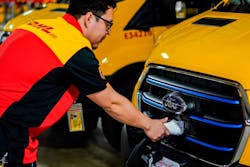PowerFlex, a provider of intelligent solar, storage, and EV charging solutions, installed 415 chargers for DHL Express at its service center facilities. The chargers are equipped with PowerFlex X energy management software that monitors, tracks, and reports on charging activities, integrating with DHL’s telematics platforms to optimize electric vehicle supply equipment (EVSE) operations.
“At DHL Express, we are always looking for ways to make our operations more sustainable,” said Laurice Bancroft, SVP of network operations for DHL Express U.S. “We selected PowerFlex to complete our EV charging stations because of their deep industry experience that helped us find a creative solution to meet our EV fleet charging needs.”
See also: Ford Pro to help equip DHL fleet with more than 2,000 e-vans
PowerFlex completed the first installation with DHL (No. 9 on the FleetOwner 500: For-Hire) in 2020. The charging stations were installed overhead to keep them out of the vehicles’ path of travel yet remain accessible for drivers to plug in at the end of the day. By reviewing the logistical needs of each fleet depot, PowerFlex recommended that DHL install Level 2 (L2) charging stations, which are typically more reliable, economically priced, and less power-intensive than Level 3 DC Fast Chargers. Another advantage of PowerFlex Level 2 chargers is the ability to increase the number of chargers on-site to enable future expansion or provide spare chargers as a backup if necessary, according to a Powerflex release.
PowerFlex L2 chargers are equipped with adaptive load management (ALM), intelligent energy management software that balances the power usage across the network of chargers to minimize expensive spikes in energy demand. With ALM, DHL installed twice the number of chargers compared to unmanaged charging with the same power limit and on-site utility infrastructure. ALM also prevents overtaxing the electrical grid, according to the release.
See also: DHL pilots Volvo’s autonomous vehicle technology
“DHL is taking a thoughtful approach to adopt new ‘fueling’ for its business needs and exploring the possibilities offered by in-house EV charging,” said Raphael Declercq, CEO of PowerFlex. “We are proud to work with DHL to support their fleet electrification. PowerFlex’s team understands the critical importance of ensuring that last-mile delivery vans are fully charged to support on-time deliveries while meeting DHL’s fleet sustainability goals.”
For these EVSE projects, PowerFlex provided DHL with a full suite of services, including site feasibility assessments, turnkey design and installation, hardware and software solutions, as well as asset management and operations and maintenance.




